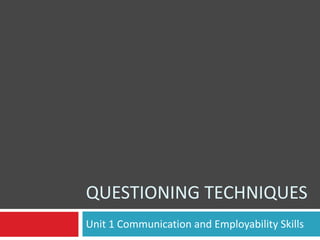Report
Share

Recommended
Presentation on questioning

Presentation on questioningJaved Iqbal Student of M.S (Teacher Education) at University of Tennessee USA
Recommended
More Related Content
What's hot (20)
Viewers also liked
Viewers also liked (15)
Socratic Questioning - employment skills and strategies

Socratic Questioning - employment skills and strategies
Steps to Design a Better Survey (Jean Fox & Scott Fricker)

Steps to Design a Better Survey (Jean Fox & Scott Fricker)
Essential Skills - Preparation for the Canadian workplace

Essential Skills - Preparation for the Canadian workplace
In-Depth Interviews: Techniques and Best Practices

In-Depth Interviews: Techniques and Best Practices
Similar to 2 questioning techniques v1
Similar to 2 questioning techniques v1 (20)
Leadership series #1 The Art of Asking Questions and Listening Effectively

Leadership series #1 The Art of Asking Questions and Listening Effectively
Guidelines in writing items for noncognitive measures

Guidelines in writing items for noncognitive measures
Communication & Interpersonal Skills at Multi Cultural Workplace

Communication & Interpersonal Skills at Multi Cultural Workplace
Types of questions and requests in different contexts

Types of questions and requests in different contexts
More from MrsNunn
More from MrsNunn (20)
2 questioning techniques v1
- 1. QUESTIONING TECHNIQUES Unit 1 Communication and Employability Skills
- 2. Questioning techniques There are a variety of questioning techniques that can be adopted to get the best out of a situation. Situations such as managing and coaching, persuading, diffusing a tricky situation and avoiding misunderstandings can be dealt with using the various techniques.
- 3. Open questions An open question will give the responder the chance to give a lengthy answer. If you ask several people the same open question all their answers are likely to be different. These are mostly used to gain a person’s opinion, find out how they feel about something, demonstrate their knowledge of an issue or give a description of something. They’re useful for finding out more detail or simply to generate an interesting conversation.
- 4. Closed questions A closed question will elicit a single word or phrase in response. This is useful if you want to easily be able to analyse the type of response given by a group of people. These types of questions are most often used to get a clear understanding of a point. They can also be used to bring a discussion to a close by finding out if others agree or not.
- 5. Probing questions These are questions that are added to allow the respondent to expand on their original answer. They are usually based on a reply to an earlier question and are ideal for clarifying an issue. They also enable to person asking to show an interest in what has been said.
- 6. Leading questions Leading questions are a way of influencing the way a person will answer. They can include assumptions about issues for example: “how much rain will fall tomorrow” includes the assumption that it will actually rain tomorrow. They are used as a way of shutting off unwanted answers.
- 7. Rhetorical questions A rhetorical question is usually asked merely for effect. Not really expecting an answer. For example: "If practice makes perfect, and no one's perfect, then why practice?" (Billy Corgan)